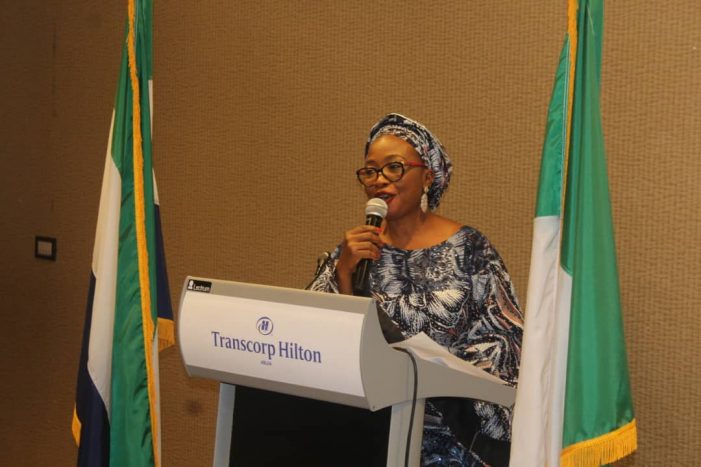The Nigerian Senate has defended its decision to suspend Senator Natasha Akpoti-Uduaghan before the Inter-Parliamentary Union, stating that her suspension was not related to allegations of sexual harassment but due to gross misconduct.
Speaking before the IPU on Wednesday, the Chairperson of the House Committee on Women Affairs and Social Development, Kafilat Ogbara, dismissed claims made by Akpoti-Uduaghan at a United Nations event that she was suspended for raising allegations of sexual harassment against Senate President Godswill Akpabio.
Ogbara said she has been mandated by the National Assembly to present a response to Akpoti-Uduaghan’s speech delivered at the 69th session of the United Nations Commission on the status of women.
“In response to the call by the President of the Inter-Parliamentary Union, Right Honorable Tulia Ackson to hear both sides of the matter, I have received a letter from the Nigerian Senate in my capacity as Chairman of the House Committee on Women Affairs and Social Development of our parliament in Nigeria and the parliamentarian representing Nigeria at this conference,” she stated.
She said, “Such allegations demand a thorough, impartial and transparent investigation. At the same time, we must ensure that fairness is upheld for all individuals involved and that justice is neither predetermined nor one-sided.
“Nigeria remains firmly committed to upholding women’s rights and combating gender-based violence through strong legal frameworks and institutions. Our Parliament and Judiciary continue to undergo reforms to strengthen these efforts.
“The ongoing legislative initiatives seek to address historical imbalances in women’s representation in our Parliament, including the Reserve Seats Bill and other crucial proposed constitutional amendments aimed at safeguarding the rights and privileges of women. These efforts underscore our commitment to fostering a more inclusive and equitable political space.”
Addressing the allegations against Akpabio, Ogbara said, “It is important to recognise that both the allegations made and the responses provided are serious matters that require careful and unbiased scrutiny.
This issue, which remains subjudice, involves multiple elements, including allegations of sexual harassment and potential violations of Senate rules. While it is necessary to engage in introspection and understand any potential connections, these matters must also be considered separately.
“It is imperative that we uphold the principles of fairness and ensure that no individual is prematurely judged without a transparent and impartial process. Therefore, I call for the following actions: A thorough and unbiased investigation, ensuring that all claims and defences are examined fairly and transparently.
“Protection of all parties involved, safeguarding the rights of all individuals, and preventing any form of intimidation or retaliation, accountability and transparency and upholding institutional integrity by ensuring that due process is rigorously followed.”
She then read the position paper of the Senate by the Senate Leader, Senator Opeyemi Bamidele.
The Senate letter read in part, “Senator Natasha-Akpoti-Uduaghan was suspended for gross misconduct and unruly behaviour and not as a result of allegation of sexual harassment or assault.
“The authority of the Senate of the Federal Republic of Nigeria firmly refutes the deliberate misinformation and false narrative being circulated by certain media organisations regarding the six-month suspension of Senator Natsaha-Akpoti-Uduaghan.
“Let it be unequivocally stated that Senator Uduaghan was suspended solely for her persistent act of misconduct and disregard for the Senate Standing Orders.”
According to the Senate, Akpoti-Uduaghan was found guilty of violating Sections 6.1 and 6.2 of the Senate rules, which led to her suspension.
“If Akpoti-Uduaghan had strictly followed its guiding principles, the Senate would have treated her petition based on merit in line with its practice, noting that she never obeyed the established practices of the institution where she was serving,” Bamidele said.
The statement further explained, “Senator Akpoti-Uduaghan’s suspension was a decision of the Committee of the Whole Senate, following the submission of a report by the Chairman of the Senate Committee on Ethics and Privileges.”
The Senate accused her of “refusing to sit in her assigned seat during plenary on February 25, 2025, despite multiple pleas from the leadership and other ranking senators,” engaging in “unruly and disruptive behaviour,” and making “abusive and disrespectful remarks against the leadership of the Senate.”
She was also accused of “defying and refusing to comply with the summons of the Senate Committee on Ethics and Privileges mandated to investigate cases of misconduct.”
The Senate maintained that her suspension was necessary to restore order and uphold the integrity of the legislative body.
“No senator, regardless of status, gender, or political affiliation, is above the rules of the Senate.
“Senator Akpoti-Uduaghan’s suspension was a direct consequence of her actions and nothing else,” the statement added.
The Senate called on media organisations to “correct the misrepresentations” and refrain from spreading “falsehoods that undermine the integrity of Nigeria’s legislative process.”
Akpoti-Uduaghan escalated her dispute with Akpabio on Tuesday by presenting her case at a United Nations forum.
The senator representing Kogi Central called for international intervention to hold the Nigerian Senate accountable.

